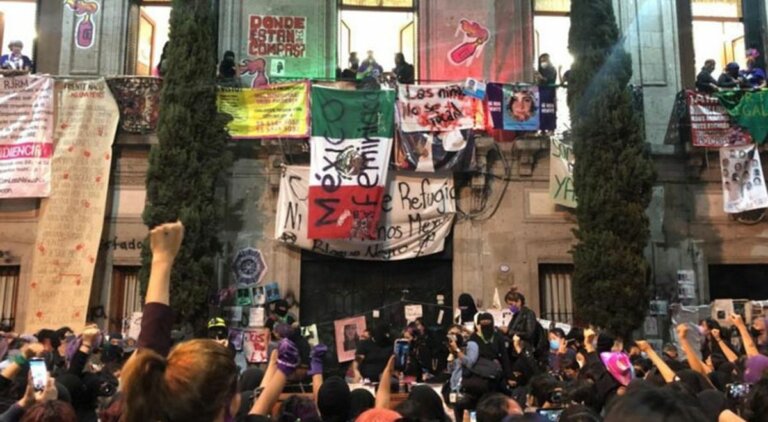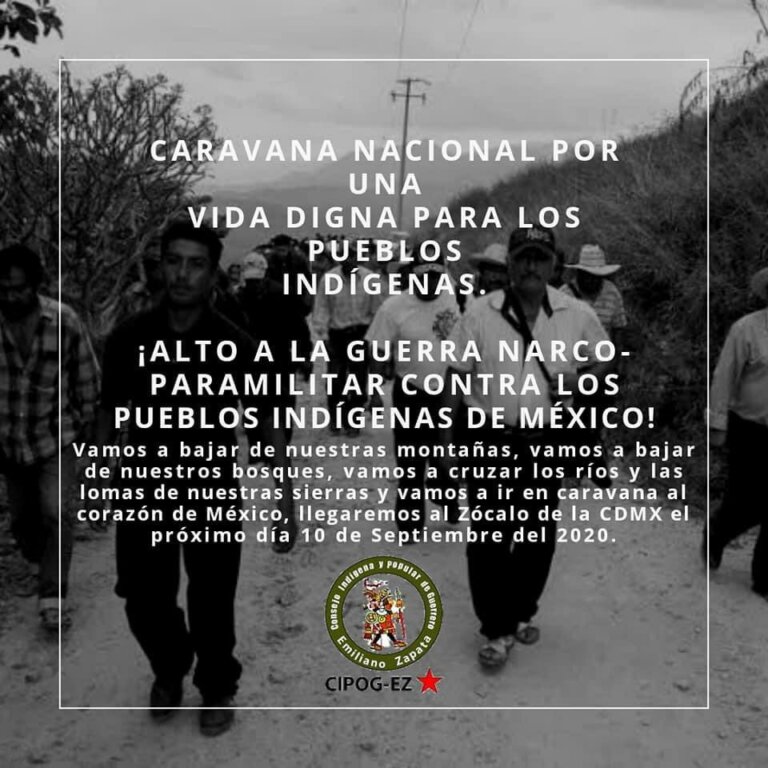The 4th SPP summit demonstrated to transnational capital how successfully a major US city and state can be transformed to realize profits. If transformation can be done in New Orleans, it can done anywhere in the US.
May 19th, 2008 by Kali Akuno
The Fourth North American Leadership Summit, held in New Orleans, Louisiana on March 21st and 22nd, 2008 marked a watershed in the Battle for New Orleans and the global peoples’ struggle against neo-liberalism and imperialism. The Summit was a continuation of the negotiations on the Security and Prosperity Partnership (SPP) agreement between the Chief Executives of Canada, Mexico, and the United States. But, it was also much, much more.
President Bush’s mission for this Summit was to consolidate many of the transformative gains he and the reactionary forces he represents have attained in New Orleans via their neo-liberal reconstruction program. This program is the most ambitious and far reaching application of neo-liberalism within US national boarders to date. In the aftermath of Hurricane Katrina this neo-liberal program has virtually eliminated the city’s labor unions and turned the public education, housing, health care, transportation, and sanitation systems into private profit making enterprises. And it doesn’t stop there. Bush also structured this Summit to be a international coming out party for Louisiana Republican Governor Bobby Jindal to showcase how an entire state government can possibly be privatized (Jindal aims to privatize the Louisiana educational system through the introduction of a state-wide voucher program).
In effect, the Fourth Summit was a calculated exhibition for trans-national capital to demonstrate how successfully a major US city and state can be transformed to realize profits. And the larger implications couldn’t be clearer. What this says is that the US, which as the center of international capital and imperialism was long thought impervious to a complete neo-liberal transformation, is open ground because if this transformation can be done in New Orleans, it can be done anywhere in the US.
Conversely, the Fourth Summit was also a critical moment for the progressive forces of the Gulf Coast Peoples’ Reconstruction Movement (RM). The coming of the summit further illuminated how central New Orleans and the Gulf Coast are to the overall program of imperialist globalization. And how central the task of dissolving the Black working class and the Black nation itself is to this project locally, nationally, and internationally. It also demonstrated the degree to which the Reconstruction Movement, and the Black Liberation Movement (BLM) which is its anchor, must organize, study, plan, and execute to overcome this challenge. To this latter end, the BLM, RM, and Global Justice movements on a whole must engage in a deeper interrogation of imperialism’s neo-liberal project to dissolve the Black Nation to gain a more strategic understanding of the project to enable the forces of resistance to launch a potentially decisive counter initiative.
Dispelling Myths
To deeply engage this interrogation some critical myths regarding the neo-liberal project must be dispelled. Chief amongst them is the position and perspective that neo-liberalism and free-trade agreements (FTA’s) within themselves are the problem. The problem, meaning what constitutes the central threat to our movements and humanity on a whole, is capitalism and imperialism. Neo-liberalism and Free Trade Agreements like the SPP, the North American Free Trade Agreement (NAFTA), etc., are mere ideological frameworks and strategic policy initiatives of capital to create the structural controls needed to realize profits.
Neo-Liberalism as an ideological program and FTA’s and their regulating instruments like the World Trade Organization (WTO), were strategically developed by capital between the two great inter-imperialist wars of the 20th century to mitigate against the destructiveness of their rivalries and the development of a genuine socialist socio-economic alternative. To this latter end, international capital, under the stewardship of US capital, created the Breton Woods institutions of the International Monetary Fund (IMF), the World Bank, and the General Agreement on Tariff’s and Trade (GATT) / WTO to regulate and gradually integrate the world-capitalist system.
However, there were always tactical differences amongst capital as to how best to regulate this system, how fast to integrate it, and how to relate to the forces opposed to this system (including the colonized and oppressed peoples and nations of the world, the working and exploited social sectors within the imperialist nations themselves, and the revolutionary nationalist and anti-capitalist state projects of the world, particularly the Eastern Soviet block nations). Between 1950 and 1972 roughly, the dominant factions of capital enacted a program of compromise that allowed for a gradual integration and a limited degree of distributed capital accumulation that tolerated workers rights and national self-determination on a limited scale. This compromise was perhaps best described as “consensus capitalism”.
This compromise was based on the steady growth of capital markets the world over following the second major inter-imperialist war (i.e. WWII). When this growth began to give way to declining rates of profit, inflation, and inter-imperialist antagonism over the divide of the spoils from the “Third World” in the 1960’s, capital, particularly US capital gradually broke with the strategy of consensus capitalism and implemented a new strategy of capitalist accumulation. This new strategy is generally referred to as either neo-liberalism or the “Washington consensus”. The Neo-Liberal strategy and program was originally articulated by Freidrich von Hayek in the 1940’s, but wasn’t unleashed on the world until the mid-1970’s with the economic dismemberment of Chile under the dictatorship of General Augusto Pinochet. With the adoption of this new strategy the implementation speed and intensity of the Breton Woods agreements, particularly the utilization of FTA’s, rapidly accelerated and created the global dynamics we are now confronting.
The Assault on the Black Nation
As Naomi Klein aptly proves in “Disaster Capitalism”, structural crises are fundamental to the success of the neo-liberal strategy and program. Her analysis however has a major blind spot. That blind spot is the strategies correlating dependence on national oppression and racial inequality as mediated by the historical process of uneven development within the capitalist world-system.
The successful implementation of the neo-liberal program in New Orleans and the Gulf Coast is directly contingent on the national oppression of New Afrikan and/or Black people, and the degree to which the region’s Black community, particularly its working class sectors, can be assaulted with little or no consequence in this transformative process.
Following the massive press for Black Liberation mounted between the 1950’s – 70’s, US capital has been aiming to fracture and crush the Black nation and the strategic “internal” threat it posses to US imperialism and its hegemony over the capitalist world-system. Capital has executed a broad scope of strategic means to this end since the 1960’s, including targeted repression and assassination, substantive buy-off programs, mass incarceration and warehousing, disinvestment from Black zones of inhabitance, and much, much more. The cumulative effect of these initiatives has been extremely devastating to the Black nation and its social stability and composition.
Despite the thorough nature of all of these initiatives, they were intentionally piecemeal. The political and social power accumulated by Blacks between the 1960’s through the 80’s, kept US capital from mounting a full on frontal assault against the Black nation. The dissipation of this power, due primarily to the retrenchment of the Black working class over the past 30 years, has shifted the balance of power decisively in favor of capital. The lack of a critical response to the emptying (in part through a forced military evacuation) of New Orleans and the numerous human rights abuses that have been committed against the peoples of the Gulf Coast after Hurricane Katrina, has allowed capital to experiment with the strategic option of ethnic cleansing. Ethnic cleansing (and genocide), barring a few rare exceptions, has not been employed on the US mainland since the 1940’s, primarily because the political costs were too high. Now that these costs have been minimalized, the strategic option of ethnic cleansing is being fully reincorporated into imperialisms arsenal (its international reintroduction started in Yugoslavia in the early 1990’s).
Although the process is as of yet incomplete, New Orleans has in essence been strategically cleansed of its Black working class. This cleansing is the direct result of the neo-liberal strategy applied to the city’s “reconstruction”. As of February 2008, more than two and half years after the Hurricane, less than half of the city’s Black working class had returned. Their return has been barred by a coordinated set of policies and actions dictated by capital and enforced by the US government on all levels (Federal, state and municipal, i.e. parish) to ensure the destruction of the city’s service institutions and ensure maximum corporate profits via privatizations (i.e. “public/private partnerships”). These policies and actions include hyper-inflated price gouging in the housing and utilities markets; the restriction of vital service provisions like water and electricity (for as long as two years in some locations in the Ninth Ward); the state seizure and demolition of tens of thousands of partially damaged and “abandoned” homes; the racist distribution of relief funds, like the Road Home Program, and insurance payouts; the barricading and destruction of more than four thousand units of public housing; the directing of the resources allocated to the city’s redevelopment towards undamaged, predominantly white sections of the city (see the Ed Blakely’s redevelopment plan); the ongoing military occupation of the city; and more. Capital has altered the “facts on the ground” as it relates to infrastructure in New Orleans to such an extent that a “right to return” for the city’s historic ethnic majority is in fact not possible. In effect, New Orleans is being subjected to the “Palestinian Option” of displacement as development for its historic Black majority.
Viewed in this strategic light, the ethnic cleansing of New Orleans must not be seen as a limited geographic or tactical engagement. Rather, it must be viewed as an advanced assault against the entire Black Nation. Why? There are three primary reasons: 1) the dislocation of a considerable portion of the Black working class has created a highly volatile social force throughout the U.S. with high material aspirations, a deeply engrained consciousness of resistance to white supremacy and exploitation, and little patience; 2) this dislocated population has been deemed an expendable surplus by capital and society at large because of this volatility, and 3) the option of containment via mass incarceration and warehousing is rapidly approaching its peak limits. Given this, capital must explore other means to control this strategic liability.
Based on developments in New Orleans and a critical analysis of the means used to generate displacement via gentrification over the past thirty years, it can be surmised that this new strategic assault will be conducted via the following means: 1) the forced displacement of Black zones of inhabitance (via combinations of mass incarceration, gentrification, land speculation, predatory lending, and disaster capitalism), 2) the permanent militarization of these zones (including direct military occupations in direct violation of the Posse Comitatus Act), 3) the systematic exclusion of broad segments of the Black working class from the labor market (including from low-wage service employment), 4) the elimination or privatization of all public services and institutions in these zones and, and 5) the institutionalization of these arrangements via special legislative means.
This is directly where the Security and Prosperity Partnership (SPP) agreement and other transnational agreements like it come into play.
The SPP and its Usages
The SPP, for all intents and purposes, is the consolidation of NAFTA via military means. These means include the development of US led special security units that could be deployed in both Mexico and Canada; the centralization of intelligence between the three states; and the creation of super-security ports and highways to secure the transport of goods, services, and security forces. Capital is advancing this strategy to contain the resistance of the peoples and working classes it has dispossessed and discarded with the passage of NAFTA and to defend the gains it has acquired at their expense.
The Black nation is a primary target of the SPP agenda. But, it is not alone. The Indigenous peoples and nations of Mexico and Canada constitute another, as are the dispossessed workers and peasants of Mexico. This is illustrated by the fourteen-year assault against the Zapatista Army of National Liberation (EZLN) and the Indigenous people of Chiapas and more recently against the Popular Assembly of the People of Oaxaca or APPO inspired by retrenched Teachers. Both of these forces have played a vanguard role in the struggle against neo-liberalism on the North American continent, and have demonstrated from day one (remembering that the Zapatistas stormed to the world’s consciousness on January 1st, 1994 which was the commencement date for NAFTA) that this program would not be met without stiff resistance.
The SPP therefore represents a critical “learning” for capital and imperialism. The question is, will the Black nation and other peoples and workers movements of North America learn in response and act in kind in a united peoples front against imperialism and its neo-liberal globalization programs?
—
source: http://neworleans.indymedia.org/news/2008/05/12551.php


